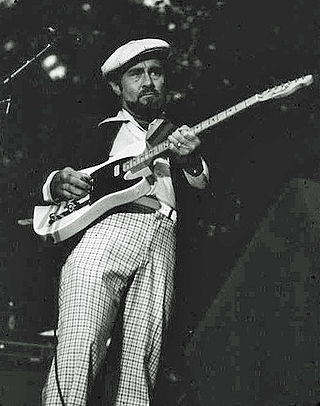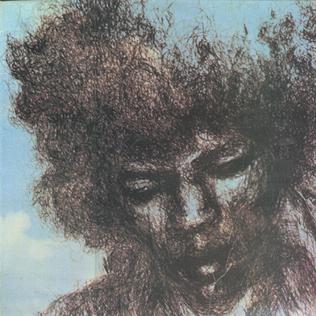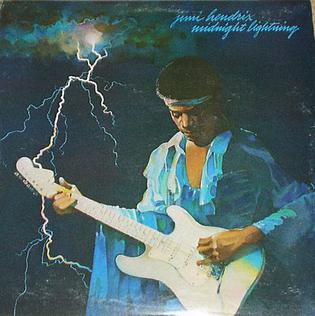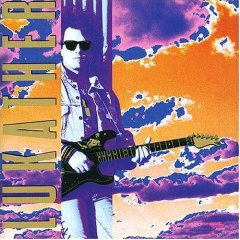
Leroy "Roy" Buchanan was an American guitarist and blues musician. A pioneer of the Telecaster sound, Buchanan worked as a sideman and as a solo artist, with two gold albums early in his career and two later solo albums that made it to the Billboard chart. He never achieved stardom, but is considered a highly influential guitar player. Guitar Player praised him as having one of the "50 Greatest Tones of All Time." He appeared on the PBS music program Austin City Limits in 1977.

First Rays of the New Rising Sun is a compilation album credited to American rock musician Jimi Hendrix, issued in April 1997 on MCA Records. Featuring songs mostly intended for his planned fourth studio album, it was one of the first releases overseen by Experience Hendrix, the family company that took over management of his recording legacy. It reached the album charts in the United States, United Kingdom, and four other countries.

Experience Hendrix: The Best of Jimi Hendrix is a compilation album of songs by American rock musician Jimi Hendrix, released in 1997 by MCA and reissued in 2010 by Legacy Recordings. The single compact disc collects 20 songs spanning his career, from his first recordings with the Jimi Hendrix Experience in 1966 to his last with Billy Cox and Mitch Mitchell in 1970.

Live at Woodstock is a posthumous live album by Jimi Hendrix released on July 6, 1999. It documents most of his performance at the Woodstock Festival on August 18, 1969, and contains Hendrix's iconic interpretation of "The Star-Spangled Banner" and other songs from the original festival film and soundtrack album.

South Saturn Delta is a posthumous compilation album by American rock musician Jimi Hendrix. Released in 1997 by Experience Hendrix, it consists of material such as demo tapes, unfinished takes and alternate mixes, and previously released material, most of which Hendrix had been working on prior to his death in 1970.

The Cry of Love is a posthumous album by American rock singer-songwriter and guitarist Jimi Hendrix. Recorded primarily in 1970, it features new material that Hendrix was working on for his planned fourth studio album before his death later that year. While most of the songs were included on proposed track listings by Hendrix, the final selection was made by recording engineer Eddie Kramer and drummer Mitch Mitchell, with input from manager Michael Jeffery. Hendrix, Kramer, and Mitchell are credited as the album's producers, with Jeffery as the executive producer.

Crash Landing is a posthumous compilation album by American guitarist Jimi Hendrix. It was released in March and August 1975 in the US and the UK respectively. It was the first Hendrix album to be produced by Alan Douglas.

Midnight Lightning is a posthumous compilation album by American rock guitarist Jimi Hendrix. It was released in November 1975 by Reprise Records in the US and Polydor Records in the UK. It was the second to be produced by Alan Douglas and Tony Bongiovi and contains demo-type recordings that were overdubbed with musicians who had never played with Hendrix. Despite including reworkings of the popular live songs "Hear My Train" and "Machine Gun", the album was not as well received as its predecessor, peaking at numbers 43 in the US and 46 in the UK.

Loose Ends is a posthumous compilation album by American guitarist Jimi Hendrix, released in February 1974 in the UK. It was the fourth and last Hendrix studio album released posthumously by manager Michael Jeffery. The album features a collection of outtakes and jams, with the exception of "The Stars That Play with Laughing Sam's Dice" which is the sole authorized track by Hendrix, in a new stereo mix by Eddie Kramer.

Nine to the Universe is a posthumous compilation album by American guitarist Jimi Hendrix. It was released in March 1980 in the US and in June 1980 in the UK. It was the third album of Hendrix recordings to be produced by Alan Douglas.

Lukather is the first solo studio album by Toto guitarist Steve Lukather, released on August 28, 1989 through Columbia Records.

"Freedom" is a rock song by Jimi Hendrix that is often regarded as one of the most fully realized pieces he wrote and recorded in the months before his death. It incorporates several musical styles and the lyrics reflect various situations facing Hendrix at the time.

Jeff Beck's Guitar Shop is the sixth studio album by guitarist Jeff Beck, released in October 1989 through Epic Records. The album reached No. 49 on the U.S. Billboard 200 and won the award for Best Rock Instrumental Performance at the 1990 Grammys; this being Beck's second album to win that award, after Flash (1985).

Lord Sutch and Heavy Friends is the debut album of English rock singer Screaming Lord Sutch. Recording began in May 1969 at Mystic Studios in Hollywood and it was released on Cotillion Records in 1970. The album featured an all-star line-up with contributions from Led Zeppelin's Jimmy Page and John Bonham, guitarist Jeff Beck, session keyboardist Nicky Hopkins, session guitarist Deniel Edwards and Jimi Hendrix Experience bassist Noel Redding. Rick Brown and Carlo Little were previously with the Savages.
This page lists the albums recorded by the rock band Hummingbird, which was formed by Bobby Tench and included other former members of The Jeff Beck Group. All three albums were produced by Ian Samwell.

Live Stock is a 1975 live album by Roy Buchanan released on Polydor. The album documents a show consisting of blues standards and a few originals played in New York City, with an additional song added from a later show in Evanston, Illinois. The cover photo was taken by Alan McDermott and sent to Roy by Australian music commentator Glenn A. Baker. Live Stock is, reportedly, one of two Buchanan albums that influenced Jeff Beck, who dedicated a song to Buchanan on his 1975 album Blow by Blow. Buchanan's last album with Polydor, it was partly made to fulfill his contractual obligations so he could move on and accept Ahmet Ertegun's offer to sign with Atlantic.

Soul Searching is the fourth album released by Average White Band.

Go Cat Go! is an album by the American musician Carl Perkins, released in 1996. For most of the songs, Perkins performs with other artists. The album includes recordings from all four ex-Beatles, with Paul McCartney, George Harrison and Ringo Starr recording new material, while John Lennon's version of "Blue Suede Shoes" comes from his album Live Peace in Toronto 1969. Jimi Hendrix's version of the same song is also an archive recording.

The Brecker Bros. Collection, Vol 1 is a compilation album by the American jazz fusion group, the Brecker Brothers. It was released by Novus Records in 1990. A second compilation, The Brecker Bros. Collection, Vol 2, was released in 1991.

Freedom: Atlanta Pop Festival is a posthumous live album by Jimi Hendrix, released in 2015. It documents his July 4, 1970, performance at the Atlanta International Pop Festival. The festival's audience, subject to a wide range of estimates from 200,000-400,000, was the largest U.S. crowd to which Hendrix played during his career.


















